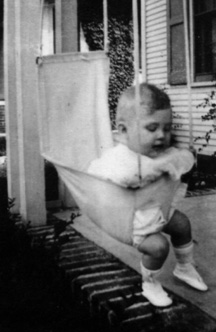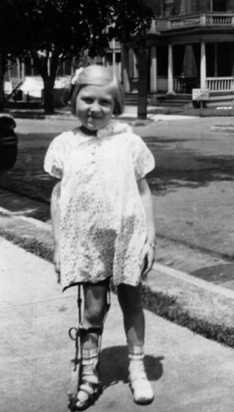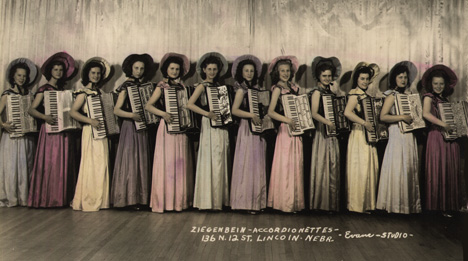|
on the lives of Don and Dorette “Dur” Kleinkauf A Winning Combination |
|||||||||||||||
|
Early Times, Early Challenges Dorette speaks of her own early life: |
|||||||||||||||
| It was late September or early October 1925 when I was almost 11 months old, visiting my maternal grandmother, Jessie Polk Zink, at her home in Sterling, Nebraska. Grandmother said I was a little fussy — she put me down for a nap on a blanket on top of the floor register in her living room. Not hearing from me when she thought she should have, she went in to pick me up. She tells me I was as limp as a wet dishrag over her arm. I was pretty sick and unable to move. She called Doc Turner and my mother and dad. Doc Turner said I had meningitis. Dad brought Dr. Colburn from Lincoln who determined I had Infantile Paralysis. The doctor said to wait until I started to walk and see what damage had been done (I had shown signs of starting to walk before I went to grandma’s house), so it wasn’t long until they noticed I was dragging my right leg as I walked. |
|||||||||||||||
 |
|||||||||||||||
|
Lincoln, Nebraska just |
|||||||||||||||
| From late May to late August in both 1930 and 1931 I went to St. Louis, MO to McLain’s Sanitarium for treatments that consisted of combinations of heat and massage with follow-on selected exercises, including the use of weight machines. While there we were befriended by the notorious gangster, Bugs Moran, who moved us into his hotel, The Roosevelt. He bought me pretty gifts and had two men drive mom and me to the sanitarium and return every day. The last year he sent for my dad to come to St. Louis for a few days visit and to show he and mother the city of St. Louis. He was a tough old criminal who could not bear watching me hobble around in my leg brace, although he could “shoot it out” with Al Capone.
Editor’s note: For a quick review of the biography of Bugs Moran, click here and have a quick return with you back button. When at home, my dad would cover the dining room table with soft blankets and massage me as they had at McLain’s. I remember there were times when there were tears in his eyes as he massaged my crippled limbs. I have a treasured note from my Dad, mailed to me while I was being worked over at the McLain Sanitarium that illustrates the tender love and care that he continuously showed me with both word and deed. |
|||||||||||||||
 |
|||||||||||||||
|
at McLalin’s Sanitarium, St. Louis, MO May 31, 1930, age 6 |
|||||||||||||||
| “Dear Dorrette,
Am sending my little ‘Golden Lock’ a little package today. Hope that you will have a lot of fun with it and will think of daddy once in a while. |
|||||||||||||||
| Honey girl, daddy loves you just the same if you do have to wear a brace and you are not a cripple. Your little foot just needs a little rest and you will be a perfect girl like all the others and then you can come home to daddy and Jack and then we will have a lot of fun. Now be a sweet little girl and love mamma nice for daddy and hug her too, a lot.
Will send you another package sometime. Good Bye honey and don’t forget to say your prayers. Your daddy loves you. Daddy!” |
|||||||||||||||
| I entered school in Lincoln, Nebraska, starting at Sheriden Elementary and then moving on through Irving Junior High and Lincoln High School. During that time I suffered all sorts of rejection that surely hurt, but somehow made me stronger. One of the early examples of this occurred at Sheriden Elementary School. Our teachers were having our class dance around the maypole and, because I quickly became tired, the teacher gruffly pulled me out of the group and made me sit on a nearby grassy bank where I was forced to watch the normal children perform with such joy and vigor. I don’t think that teacher had a clue as to what kinds of challenges my small body was faced with, nor the humiliation I felt at being so much less capable then the other class members. At age 12, in 1936, Mom and Dad submitted me to orthopedic surgery for right ankle stabilization and a muscle transplant at Lincoln General Hospital. Dad was learning to be a furrier at Cadwallader Fur Co. in Lincoln. He refused to allow me to be cared for at the Orthopedic Hospital where I would be a ward of the State of Nebraska. He put his car on blocks in the garage, Mom went to work at Gold and Company Department Store for $15.00 a week. They paid for my surgery themselves. My father tried everything to help me develop, physically and psychologically — soft- shoe tap dancing, swimming (which helped a great deal), piano lessons and accordion lessons. Grandma and Aunt Francis would sneak me out to the chiropractor, which used to gripe my folks - ha! I finally was able to shed my brace. My initial incentive was to look like everyone else at a special birthday party down the street on Ryons. Later, my Dad taught me to dance. |
|||||||||||||||
 |
|||||||||||||||
| My folks saw to it that I got accordion lessons in hopes it would strengthen my back Here you see the “Accordionettes” of Lincoln, Nebraska. I am the fifth one from the right-hand side in the pink dress. I was 15 at the time. This group played at county fairs, etc. When we did a “gig” we were paid $35.00, divided 12 ways. A couple of the older girls went overseas with the USO after WW II began. My mother made the hats for all the girls. End of Chapter I, Part II — Go to Chapter 2, Part I or you may go to Cover Page — Editor’s Introduction — Table of Contents Chapter 1, Part I — Chapter 1, Part II Chapter 2, Part I — Chapter 2 Part II |
|||||||||||||||